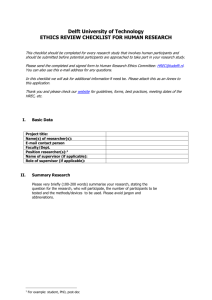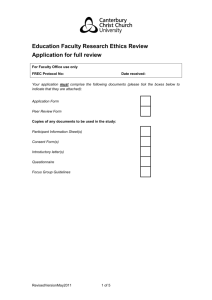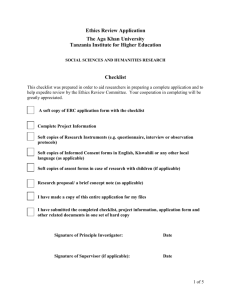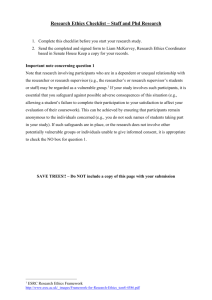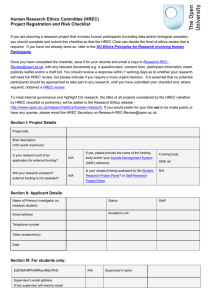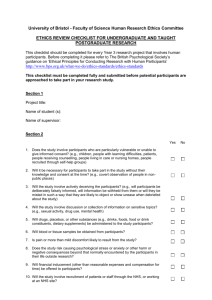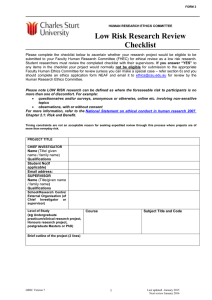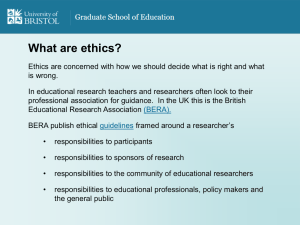Research ethics checklist
advertisement
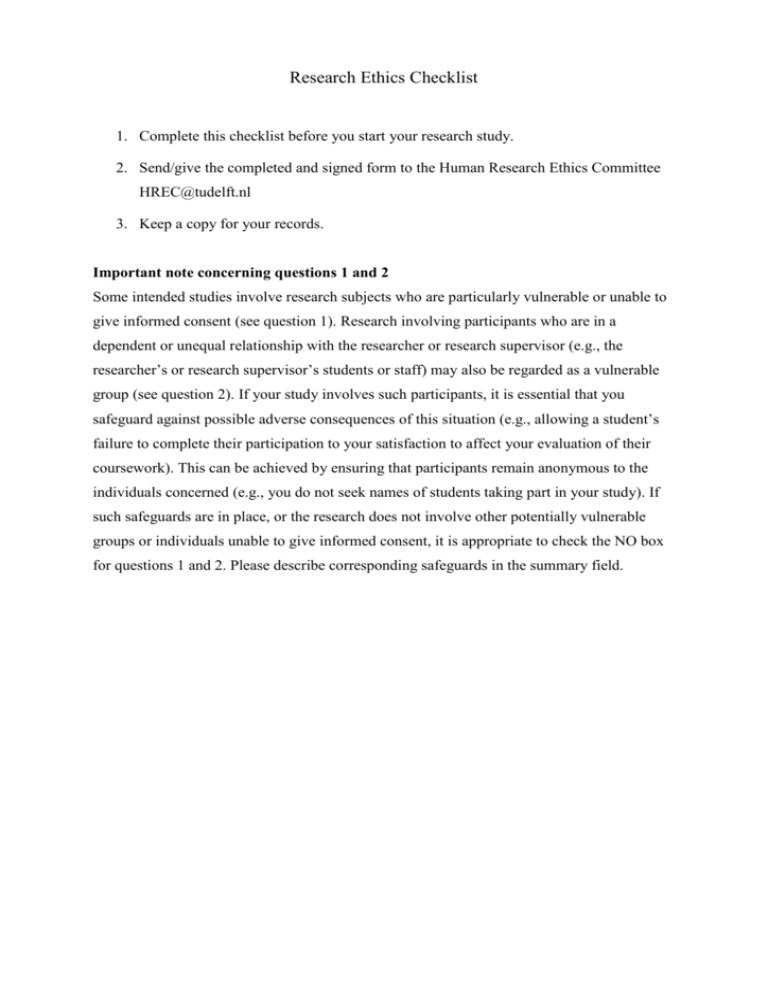
Research Ethics Checklist 1. Complete this checklist before you start your research study. 2. Send/give the completed and signed form to the Human Research Ethics Committee HREC@tudelft.nl 3. Keep a copy for your records. Important note concerning questions 1 and 2 Some intended studies involve research subjects who are particularly vulnerable or unable to give informed consent (see question 1). Research involving participants who are in a dependent or unequal relationship with the researcher or research supervisor (e.g., the researcher’s or research supervisor’s students or staff) may also be regarded as a vulnerable group (see question 2). If your study involves such participants, it is essential that you safeguard against possible adverse consequences of this situation (e.g., allowing a student’s failure to complete their participation to your satisfaction to affect your evaluation of their coursework). This can be achieved by ensuring that participants remain anonymous to the individuals concerned (e.g., you do not seek names of students taking part in your study). If such safeguards are in place, or the research does not involve other potentially vulnerable groups or individuals unable to give informed consent, it is appropriate to check the NO box for questions 1 and 2. Please describe corresponding safeguards in the summary field. Delft University of Technology ETHICS REVIEW CHECKLIST FOR STAFF AND PhD RESEARCH This checklist should be completed for every research study that involves human participants. Before completing it please refer to the Central Committee on Research Involving Human Subjects (CCMO): http://www.ccmo.nl/en/ This checklist must be completed fully and submitted before potential participants are approached to take part in your research study. Project title: Name(s) of researcher(s): Job title(s) of researcher(s): Name of supervisor (if applicable): Role of supervisor (if applicable): Yes 1. Does the study involve participants who are particularly vulnerable or unable to give informed consent? (e.g., children, people with learning difficulties, patients, people receiving counselling, people living in care or nursing homes, people recruited through self-help groups) 2. Does the study use participants who are in a subordinate position to the researcher(s)? (e.g. students being supervised by the researcher) 3. Will it be necessary for participants to take part in the study without their knowledge and consent at the time? (e.g., covert observation of people in nonpublic places) 4. Will the study involve actively deceiving the participants? (e.g., will participants be deliberately falsely informed, will information be withheld from them or will they be misled in such a way that they are likely to object or show unease when debriefed about the study) 5. Will the study involve discussion or collection of information on sensitive topics? (e.g., sexual activity, drug use, mental health) 6. Will drugs, placebos, or other substances (e.g., drinks, foods, food or drink constituents, dietary supplements) be administered to the study participants? 7. Will blood or tissue samples be obtained from participants? 8. Is pain or more than mild discomfort likely to result from the study? 9. Does the study risk causing psychological stress or anxiety or other harm or negative consequences beyond that normally encountered by the participants in their life outside research? 10. Will financial inducement (other than reasonable expenses and compensation for time) be offered to participants? 11. Are the participants, outside the context of the research, in a dependent or subordinate position to the investigator (such as own children or students)? No 12. Will the experiment collect and store videos, pictures, or other identifiable data of human subjects? a. If “yes”, you have to ensure that collected data is safeguarded physically and will not be accessible to anyone outside the study. Furthermore, the data has to be de-identified if possible and has to be destroyed after a scientifically appropriate period of time. 13. Will the experiment involve the use of devices that are not “CE” certified? b. If “yes”, was the device built in-house? i. If “yes”, was it inspected and certified safe by a safety expert at TU Delft? (please provide records of the inspection) ii. If “no”, was it inspected by some other, qualified authority in safety and approved? (please provide records of the inspection) 14. Has or will this research be submitted to a research ethics committee other than this one? (if so, please provide details) Name of Committee: Date of submission: Submission or approval number (if known): If you have answered NO to all questions above (excluding sub-questions) above (i.e., a more detailed submission to an ethics committee is not required), please very briefly (100-200 words) summarise your research, stating the question for the research, who will participate, the number of participants to be tested and the methods to be used. For example: To investigate whether playing violent video games leads to violent ideation, recruited subjects will be requested to provide information regarding their video game habits, and any violent thoughts or episodes they have recently been involved in. This questionnaire will typically take no more than 15 minutes to complete. To confirm informed consent, the system will allow participants to complete the questionnaire only after they have checked a box verifying that they have read a brief description of the study which appears at the top of the questionnaire. After completing the questionnaire participants will receive an email which will explain the purpose of the research and thank them for their participation. Write or type your summary here: Send the completed and signed form to Human Research Ethics Committee: HREC@tudelft.nl If you have answered ‘NO’ to all questions you can proceed with your study. If you have answered ‘YES’ to any of the questions above, you will need to submit an application for ethics approval, including sample consent documents to this committee. To submit your research proposal for consideration by the Human Subjects Research Ethics Committee, use the ethics approval application form available on Blackboard. This Committee meets monthly during term time, and less frequently out of term time. Signature(s) of researcher(s) Date: Signature research supervisor (if applicable): Date:

